Aromatherapy offers significant benefits for mental clarity and relaxation by using essential oils that influence mood and cognitive function. Key oils like lavender and rosemary can reduce stress, enhance focus, and improve memory retention. Research supports these effects, showing that inhaling specific oils stimulates brain activity linked to alertness and calmness. Incorporating aromatherapy into daily routines can lead to better overall mental health and well-being.
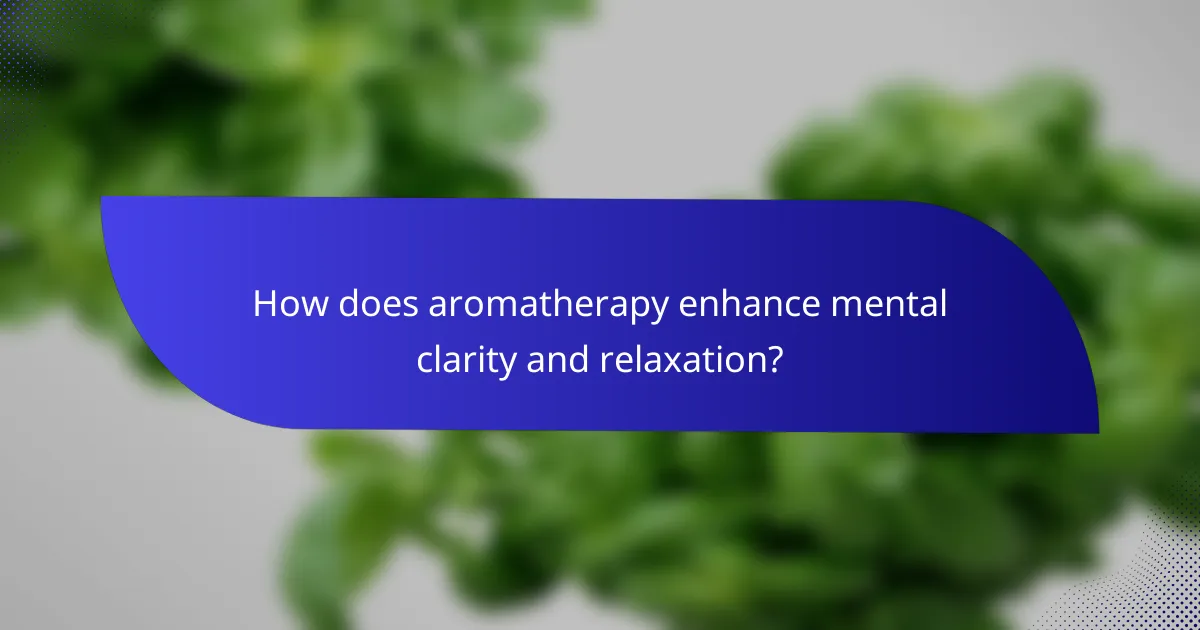
How does aromatherapy enhance mental clarity and relaxation?
Aromatherapy enhances mental clarity and relaxation by utilising essential oils that influence mood and cognitive function. These oils, such as lavender and rosemary, contain compounds that can reduce stress and improve focus.
Research indicates that inhaling certain essential oils can stimulate brain activity associated with alertness and calmness. For instance, rosemary oil has been linked to enhanced memory retention, while lavender oil is known for its calming effects that promote relaxation.
Incorporating aromatherapy into daily routines can lead to improved mental clarity and a more relaxed state. Regular use of these oils may also contribute to better overall mental health by reducing anxiety and boosting mood.
What essential oils are most effective for mental clarity?
Peppermint, rosemary, and lemon essential oils are most effective for enhancing mental clarity. These oils stimulate the mind and improve focus, contributing to relaxation and cognitive function.
Peppermint oil has a refreshing scent that increases alertness and reduces fatigue. Rosemary oil is known to enhance memory retention and concentration. Lemon oil promotes a positive mood and reduces stress, further aiding mental clarity.
In aromatherapy, these essential oils can be diffused, inhaled directly, or applied topically with a carrier oil for optimal benefits. Incorporating these oils into daily routines can significantly improve mental performance and relaxation.
Which scents promote relaxation and stress relief?
Scents like lavender, chamomile, and sandalwood promote relaxation and stress relief effectively. Lavender is known for its calming effects, reducing anxiety and improving sleep quality. Chamomile offers soothing properties that help alleviate stress and promote tranquility. Sandalwood enhances mood and creates a serene environment. Other beneficial scents include bergamot, which can uplift mood, and ylang-ylang, known for its ability to reduce tension. Incorporating these essential oils in aromatherapy can significantly enhance mental clarity and relaxation.
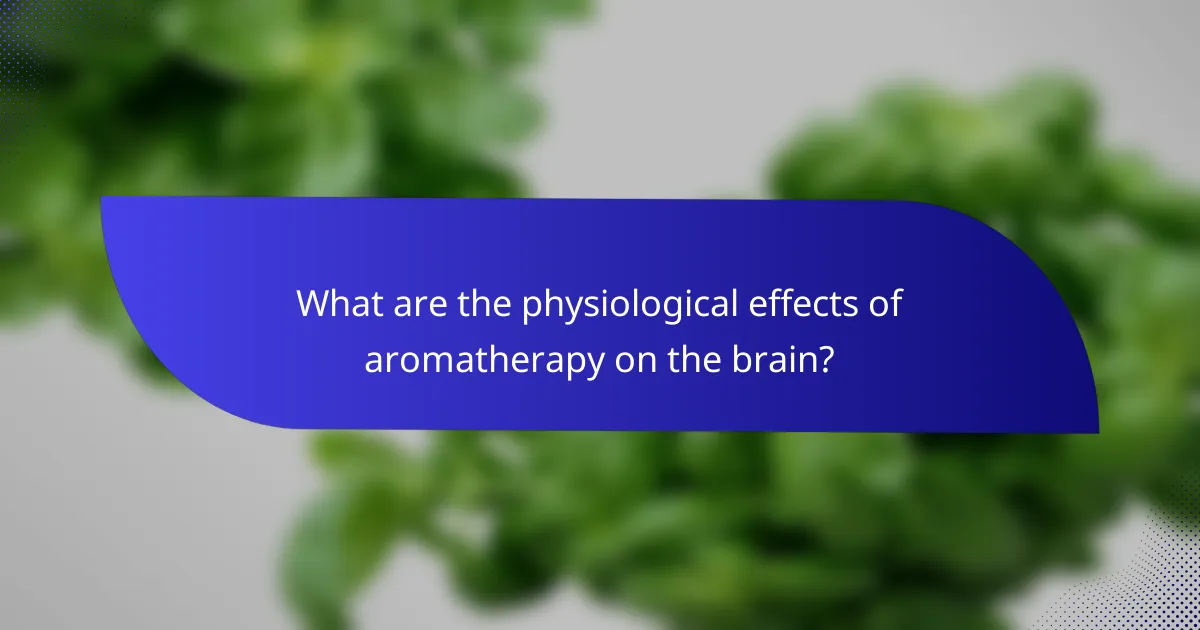
What are the physiological effects of aromatherapy on the brain?
Aromatherapy positively affects the brain by enhancing mental clarity and promoting relaxation. Essential oils stimulate brain regions linked to mood regulation and cognitive function. For example, lavender oil reduces anxiety and improves sleep quality, while peppermint oil enhances alertness and concentration. Research shows that inhaling essential oils can lower cortisol levels, leading to reduced stress. Additionally, scents like lemon and rosemary have been associated with improved memory retention. These physiological effects make aromatherapy a valuable tool for mental wellness.
How do essential oils interact with the limbic system?
Essential oils interact with the limbic system, enhancing mental clarity and promoting relaxation. They stimulate brain areas responsible for emotions and memories, influencing mood and cognitive function. For example, lavender oil is known for its calming effects, while citrus oils can boost alertness. Research indicates that inhaling certain essential oils can lead to reduced anxiety and improved focus. This interaction underscores the therapeutic potential of aromatherapy in mental well-being.
What role do neurotransmitters play in aromatherapy’s effectiveness?
Neurotransmitters play a crucial role in aromatherapy’s effectiveness by influencing mood and cognitive function. Essential oils can stimulate the release of neurotransmitters like serotonin and dopamine, promoting relaxation and mental clarity. For instance, lavender oil is known to enhance GABA levels, which reduces anxiety and improves sleep quality. This interaction between scents and neurotransmitter activity underlines aromatherapy’s potential as a holistic approach to mental wellness.
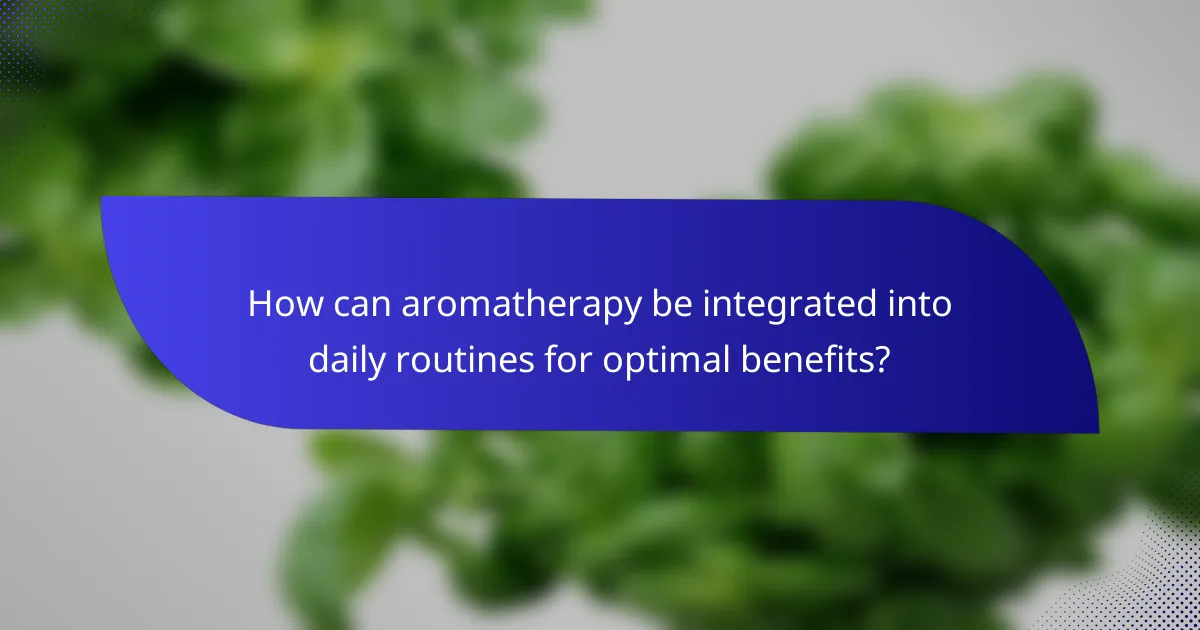
How can aromatherapy be integrated into daily routines for optimal benefits?
Aromatherapy can be easily integrated into daily routines by using essential oils in various forms. Start your day with a few drops of peppermint oil in your morning shower to enhance mental clarity. Use a diffuser with lavender oil during work hours to promote relaxation and focus. Incorporate aromatherapy into your evening routine by adding chamomile oil to a warm bath for stress relief. Lastly, apply a calming blend of essential oils to your pulse points before bedtime to improve sleep quality.
What are the best methods of application for essential oils?
The best methods of application for essential oils include diffusion, topical application, and inhalation. Diffusion disperses oils into the air, enhancing mood and mental clarity. Topical application, often diluted with a carrier oil, delivers localized benefits, promoting relaxation. Inhalation provides immediate effects, useful for stress relief. Each method can be tailored to individual preferences and desired outcomes.
How can aromatherapy be used in the workplace to improve focus?
Aromatherapy can enhance focus in the workplace by using essential oils like peppermint and lemon. These oils stimulate the brain, improve concentration, and reduce stress. Incorporating diffusers or personal inhalers can create a calming environment, fostering mental clarity. Studies show that aromatherapy can increase productivity by up to 30%.
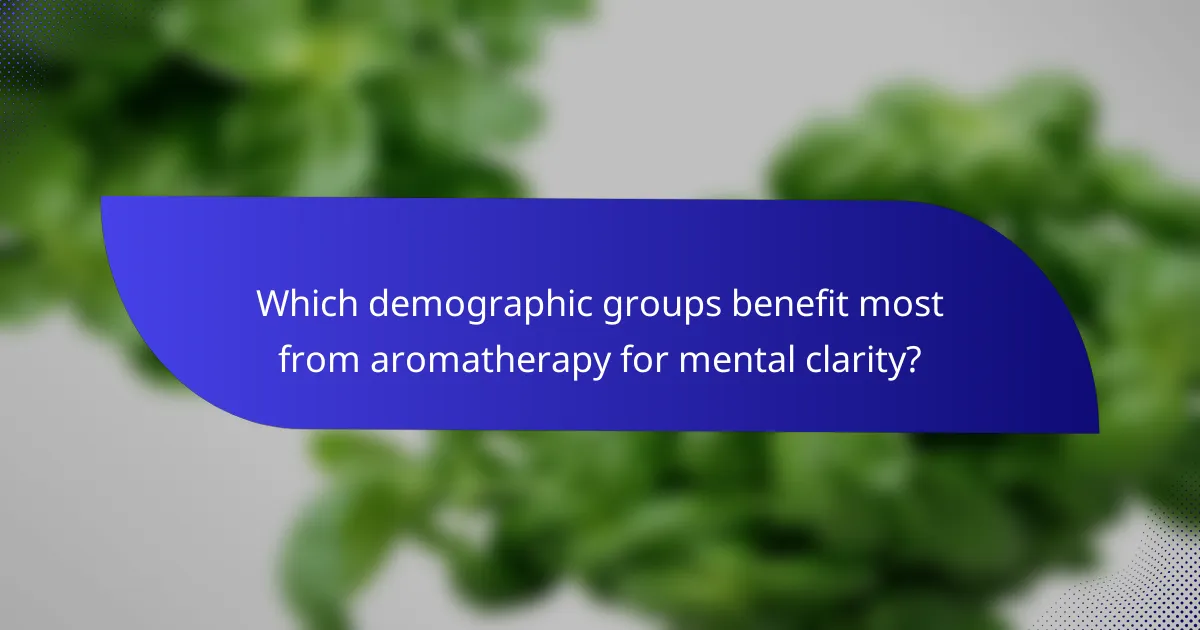
Which demographic groups benefit most from aromatherapy for mental clarity?
Individuals experiencing stress or anxiety, students, and professionals in high-pressure environments benefit most from aromatherapy for mental clarity. Aromatherapy enhances focus and reduces mental fatigue through essential oils like peppermint and rosemary.
Research shows that college students using aromatherapy report improved concentration levels. Additionally, professionals in fast-paced work settings find essential oils helpful in maintaining productivity and mental sharpness.
Older adults may also experience benefits, as aromatherapy can enhance cognitive function and reduce feelings of confusion.
Overall, aromatherapy serves diverse demographic groups, providing mental clarity and relaxation tailored to their specific needs.
How do age and lifestyle influence the effectiveness of aromatherapy?
Age and lifestyle significantly influence the effectiveness of aromatherapy for mental clarity and relaxation. Younger individuals often experience heightened sensitivity to scents, enhancing aromatherapy’s impact. Lifestyle factors, such as stress levels and daily routines, also determine how effectively aromatherapy can promote relaxation.
For instance, individuals with high-stress lifestyles may benefit more from calming essential oils like lavender. In contrast, those seeking mental clarity might find invigorating scents like peppermint more effective. Additionally, the frequency of use can affect outcomes; regular practitioners may develop a stronger positive response to aromatherapy.
Age-related changes, such as diminished olfactory sensitivity, can lead to varying experiences with aromatherapy. Older adults may require stronger scents for the same effect. Overall, personal circumstances shape the aromatherapy experience, tailoring its benefits to individual needs.
What unique benefits does aromatherapy offer to specific populations, such as students or professionals?
Aromatherapy offers unique benefits for mental clarity and relaxation, particularly for students and professionals. It enhances focus, reduces stress, and promotes emotional well-being.
For students, essential oils like peppermint improve concentration and cognitive performance. Research indicates that inhaling peppermint oil can increase alertness and retention of information.
Professionals benefit from lavender and eucalyptus oils, which help alleviate workplace stress and anxiety. These oils create a calming environment, enhancing productivity and creativity.
Overall, aromatherapy serves as a natural tool for mental clarity and relaxation, tailored to the needs of specific populations.
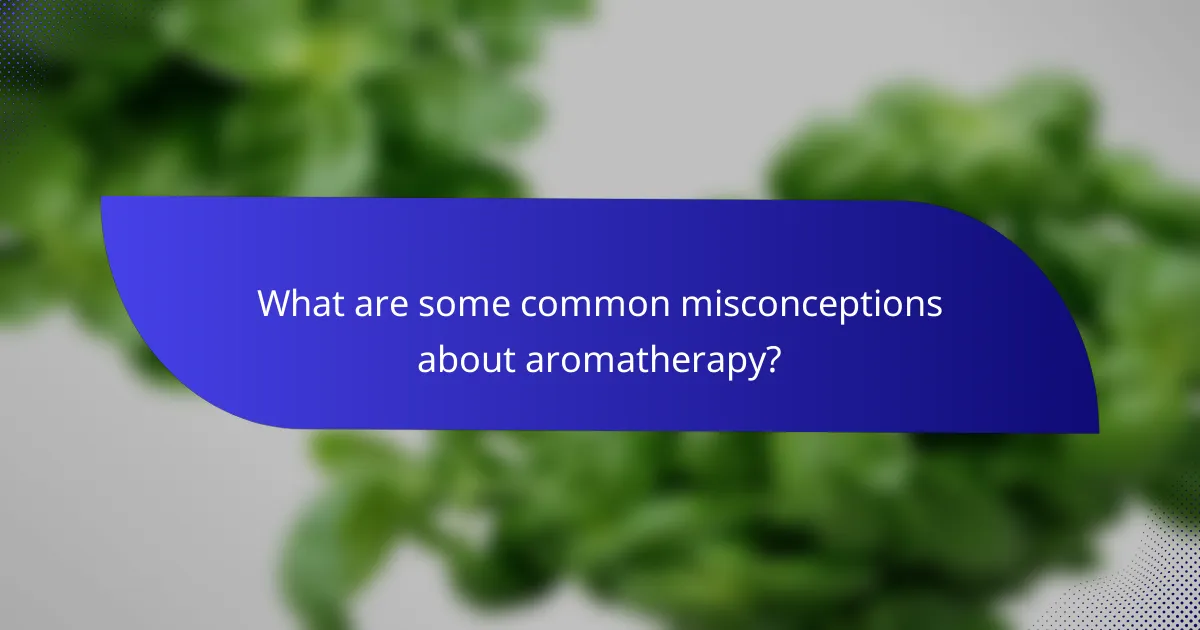
What are some common misconceptions about aromatherapy?
Many people mistakenly believe that aromatherapy is merely a luxury or an alternative to traditional medicine. In reality, it offers significant benefits for mental clarity and relaxation. Some common misconceptions include the idea that aromatherapy is only about pleasant scents, ignoring its therapeutic properties. Another misconception is that it requires extensive training to use effectively, while simple inhalation or topical application can yield benefits. Additionally, some think that aromatherapy is ineffective, but studies show it can reduce anxiety and improve cognitive function. Finally, many believe that all essential oils are safe, neglecting the fact that some can cause adverse reactions.
Why do some people doubt the efficacy of aromatherapy?
Some people doubt the efficacy of aromatherapy due to a lack of scientific evidence supporting its benefits. Critics often point to the subjective nature of experiences, which can lead to skepticism. Additionally, the variability in individual responses to essential oils contributes to doubts about consistent outcomes. While many users report enhanced mental clarity and relaxation, these results can vary widely among individuals.
How can these misconceptions be addressed?
Misconceptions about aromatherapy can be addressed through education and evidence-based practices. Providing clear information on essential oils and their effects enhances understanding. Workshops and credible resources can clarify benefits, such as promoting mental clarity and relaxation. Engaging testimonials can also help dispel myths, showcasing real-life experiences that highlight aromatherapy’s positive impact.
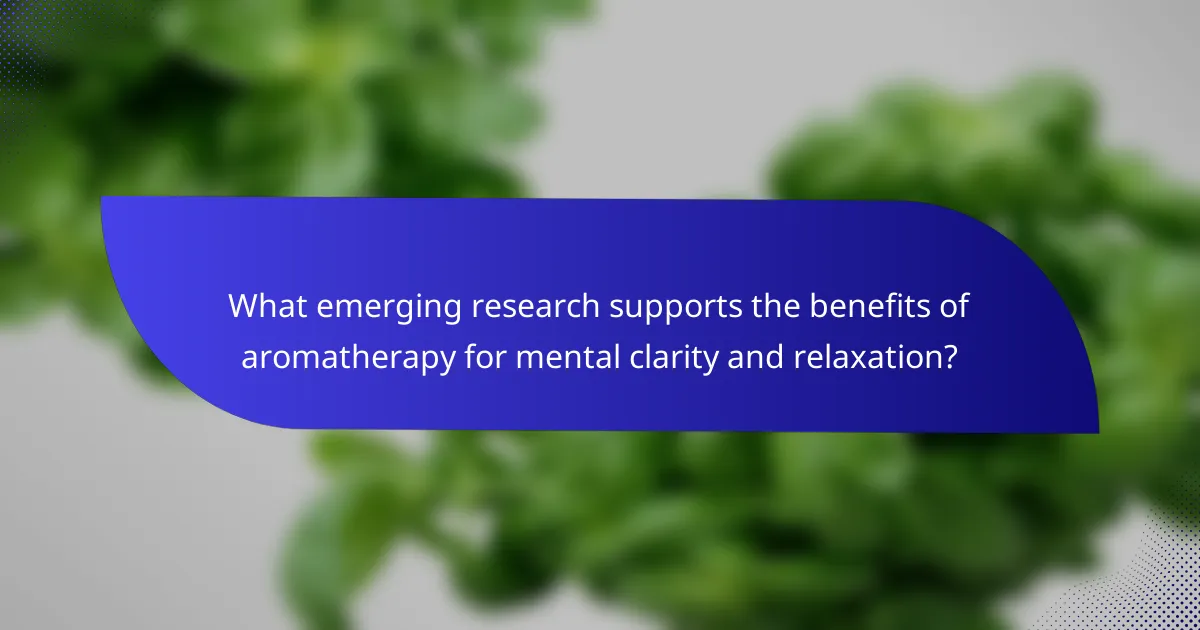
What emerging research supports the benefits of aromatherapy for mental clarity and relaxation?
Emerging research indicates that aromatherapy enhances mental clarity and relaxation through specific essential oils. Studies show that oils like lavender and peppermint can reduce anxiety and improve cognitive function. For instance, a clinical trial found that inhaling lavender oil significantly decreased stress levels, promoting a calm state conducive to focus. Additionally, peppermint oil has been linked to improved memory and alertness, making it a valuable tool for enhancing mental clarity. Overall, the integration of these essential oils in daily routines supports both relaxation and cognitive enhancement.
Which studies highlight the psychological benefits of specific essential oils?
Studies indicate that essential oils such as lavender, bergamot, and peppermint enhance mental clarity and promote relaxation. Research shows lavender oil significantly reduces anxiety and improves sleep quality, while bergamot oil has been linked to lower stress levels. A study found peppermint oil can enhance cognitive performance and alertness. These oils demonstrate unique attributes that contribute to psychological well-being.
What future trends are expected in the field of aromatherapy?
Future trends in aromatherapy focus on enhancing mental clarity and relaxation through innovative practices and technology. Personalised blends tailored to individual needs will gain popularity, utilising data from wellness apps and AI. Integration of virtual reality experiences with aromatherapy will create immersive relaxation environments. Research will continue to explore the neurological impacts of essential oils, strengthening the evidence base for their benefits. Additionally, sustainable sourcing of essential oils will become a priority, aligning with global environmental concerns.
What practical tips can enhance the use of aromatherapy for mental clarity and relaxation?
To enhance the use of aromatherapy for mental clarity and relaxation, consider these practical tips. Select essential oils known for their calming and focusing properties, such as lavender and peppermint. Use a diffuser to disperse the oils in your environment, creating a soothing atmosphere. Incorporate aromatherapy into your daily routine by applying oils topically with a carrier oil or adding them to a warm bath. Practice mindful breathing while inhaling the scents to deepen relaxation and clarity. Lastly, maintain a clean and organised space to maximise the positive effects of aromatherapy.